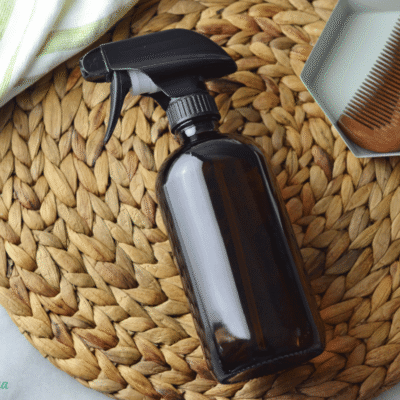If you’re still using store-bought lotion there are super easy natural alternatives that are fun to make! This DIY lotion recipe has three basic ingredients and only takes ten minutes to whip together.
The basic recipe is an ultra-moisturizing water-free version that lasts for years without preservatives. While lotion is technically a formulation of water and oil-based skincare ingredients, this one is oil-based. It feels more like a body butter and is great for dry skin.
Homemade Lotion
I discovered years ago that I could use natural ingredients to make my own skincare products and I haven’t looked back since! From homemade lip balm to whipped body butter I love making my own. Lotion bars were one of the first things I made and I’ve branched out to other kinds of lotion too. This version uses unrefined coconut oil, almond oil, and shea butter to nourish skin deeply.
Most lotions use emulsifying wax to blend distilled water and carrier oils together. It can be tricky to do at home. Plus it requires preservatives to keep it from going bad! This DIY lotion skips that problem by eliminating the water. You can further extend the shelf life by using vitamin E. This antioxidant helps oils not go rancid as quickly.
Choosing a Carrier Oil
I use sweet almond oil for the carrier oil since it’s a middle of the road oil. It’s not as heavy as coconut oil, but it’s more moisturizing than something like grapeseed oil. You could replace it with whatever liquid carrier oil you prefer. Jojoba, olive oil, or avocado oil are also good options.
This lotion is ultra-moisturizing and more oily than water-based lotions so you won’t need to use as much. It also has a longer shelf life than some homemade lotion recipes. All the ingredients are already shelf stable and no water is added.
Custom Lotion Making
Once you master the base recipe, have fun customizing your lotion to your skin type, skin conditions, and desired scent!
There are endless variations, but some of my favorites are:
- Baby Lotion – Infuse the oil with dried calendula and chamomile before making the lotion.
- Cooling Muscle Rub – Add peppermint, wintergreen, and ginger for sore muscles.
- Anti-aging Face Lotion – Use argan oil and add lavender and patchouli essential oils.
- Lavender and Vanilla Lotion – Add a few drops of lavender and a little natural vanilla extract.
Essential Oil Safety
So how many drops of essential oils should you add to your DIY lotion? It depends on the essential oil and your preference. If you add the optional shea butter, 45 drops of essential oil will be a 1% dilution. A 2% dilution is generally considered safe for skincare products like lotion.
If you like a really strong scent you could double the amount (to 2%). Or if you prefer a lighter scent or have more sensitive skin, you could cut the amount in half (or even less!). I avoid using essential oils on little ones, especially babies.
Certain oils like wintergreen, cinnamon, and lemongrass are harsher and need to be used in smaller amounts. Others, like grapefruit and lime, are phototoxic. Some of my favorite skin-friendly essential oils to use include:
Don’t Want to Make It?
If you want healthy lotion but don’t want to make it or don’t have the ingredients there are some good store-bought options. These lotions have clean ingredients and help hydrate thirsty skin:
Homemade DIY Lotion Recipe
Make smooth, luxurious lotion at home with almond oil, coconut oil, beeswax, and optional essential oils.
Yield: 9 ounces
-
Combine the almond oil, coconut oil, beeswax, and shea or cocoa butter, in a double boiler. Or use a glass bowl on top of a simmering pan of water.
-
Stir occasionally as the ingredients melt.
-
Once the ingredients are completely melted, add the vitamin E oil and any essential oils or vanilla.
-
Pour into a glass jar or tin for storage and cool to room temperature. Small mason jars work perfectly for this. This will not pump well in a lotion pump!
- A little goes a long way! This lotion is incredibly nourishing and great for diaper rash, eczema, and for preventing stretch marks.
- Store in a cool, dry place for up to 1-2 years.
Other Homemade Lotion Recipe Variations
There are lots of ways you can make your own lotion at home. Here are some more lotion tutorials to try:
Ever made DIY lotion before? How did it go? Let me know below!





